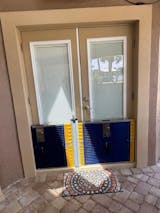Have you ever wondered how to keep your hard-earned cash from flying out the window? Well, buckle up because we're about to dive into the world of insulation and why giving your windows and doors some TLC can be your wallet's best friend.
Keep on reading, and you will learn about how a moderate investment of your money and time will help you keep your bills at bay and take energy consumption under control.

The Role of Windows and Doors for Your Energy Bills
Windows and doors play a crucial role in the energy consumption of a home, primarily due to their impact on heat transfer. Here's a breakdown of their roles:
- Heat Transfer: Windows and doors are areas where significant heat transfer occurs. During colder months, heat from inside the home can escape through windows and doors to the colder exterior, leading to increased energy consumption as the heating system works harder to maintain indoor comfort. Conversely, during hotter months, heat from outside can penetrate through windows and doors, requiring more energy for cooling.
- Insulation and Drafts: The quality of windows and doors' insulation greatly affects energy consumption. Older or poorly insulated windows and doors may have gaps, cracks, or inadequate seals, allowing heated or cooled air to leak out and outside air to infiltrate the home. This results in energy loss and increased utility bills as heating and cooling systems compensate for the temperature fluctuations caused by drafts.
- Solar Heat Gain: Windows also influence solar heat gain, which is the amount of heat transferred into the home from sunlight. While some solar heat gain can be beneficial during colder months, excessive heat gain in warmer climates can lead to overworking air conditioning systems and higher energy consumption.
- Efficiency Ratings: Modern windows and doors often come with energy efficiency ratings, such as U-factor and Solar Heat Gain Coefficient (SHGC). These ratings indicate the product's ability to resist heat transfer and control solar heat gain. Choosing windows and doors with higher efficiency ratings can significantly reduce energy consumption and improve home comfort.
- Sealing and Maintenance: Proper installation, sealing, and maintenance of windows and doors are essential to minimize energy loss. Weather stripping, caulking, and regular inspections can help seal gaps and prevent drafts, ensuring that windows and doors contribute to energy efficiency rather than energy waste.

Why is insulation important?
So, what`s the deal with insulation? Why is it so important, and how does it help to save money year-round, no matter where you live?
Here is what you need to know:
- Energy Efficiency: Insulation acts as a barrier against heat transfer, helping to keep the desired temperature inside the home stable. During colder months, it prevents heat from escaping, reducing the need for heating systems to work overtime. Similarly, in warmer months, insulation helps to keep the heat out, easing the burden on air conditioning units. This improved energy efficiency translates to lower utility bills and reduced energy consumption.
- Comfort: Proper insulation creates a more comfortable living environment by minimizing temperature variations throughout the home. It helps maintain consistent indoor temperatures, eliminating cold spots in winter and hot spots in summer. This results in a more pleasant and comfortable living space for occupants year-round.
- Moisture Control: Insulation also plays a role in controlling moisture levels within the home. By reducing condensation and humidity, insulation helps to prevent mold, mildew, and moisture-related damage to the building structure and interior finishes. This is particularly important in areas with high humidity or during periods of heavy rainfall.
- Soundproofing: Insulation can help dampen noise transmission between rooms and from outside sources, providing a quieter and more peaceful living environment. This is especially beneficial for homes located in noisy urban areas or near busy streets.
- Environmental Impact: Improving the energy efficiency of homes through proper insulation reduces greenhouse gas emissions associated with heating and cooling. By consuming less energy, homeowners can lower their carbon footprint and contribute to environmental sustainability efforts.
- Long-Term Savings: While the upfront cost of insulation installation may seem significant, it offers long-term savings through reduced energy bills and lower maintenance costs. Investing in quality insulation can increase the overall value of the home and provide a solid return on investment over time.
In summary, insulation is essential for maintaining energy efficiency, improving comfort, controlling moisture levels, enhancing soundproofing, reducing environmental impact, and saving money in the long run. It is a fundamental component of a well-constructed and energy-efficient home.

So, how does all that help to reduce energy bills?
To ensure that your windows and doors help you save money and reduce energy consumption rather than wasting it, consider the following steps:
- Choose energy-efficient windows and doors: When selecting new windows and doors or replacing existing ones, opt for energy-efficient models with high-performance features. Look for products with Energy Star certification, which indicates they meet strict energy efficiency criteria set by the Environmental Protection Agency (EPA). Energy-efficient windows and doors are designed to minimize heat transfer, reduce air leakage, and control solar heat gain, ultimately lowering energy consumption.
- Consider Insulated Glass and Frames: Insulated glass, also known as double- or triple-pane glass, provides better thermal insulation compared to single-pane windows. Additionally, windows and doors with insulated frames, such as vinyl, fiberglass, or wood with thermal breaks, further enhance energy efficiency by reducing heat transfer through the frame. Insulated glass and frames help maintain indoor comfort and reduce heating and cooling costs.
- Ensure Proper Installation: Proper installation is crucial for maximizing the energy-saving benefits of windows and doors. Improperly installed products may have gaps or air leaks that compromise their effectiveness. Hire experienced professionals or follow manufacturer guidelines to ensure correct installation, including proper sealing and insulation around the frames.
- Seal Gaps and Weatherize: Regularly inspect windows and doors for gaps, cracks, or worn weather-stripping that could allow air leakage. Seal any gaps with caulking or weather stripping to prevent drafts and improve energy efficiency. Consider adding draft guards or door sweeps to minimize air infiltration at the bottom of doors. Proper weatherization helps maintain airtight seals and reduces energy waste.
- Utilize Window Treatments: Use window treatments, such as blinds, shades, curtains, or drapes, to enhance energy efficiency. Close them during hot summer days to block out sunlight and reduce solar heat gain, then open them during cooler evenings to allow for natural ventilation. In winter, close window treatments at night to retain heat and open them during the day to capture solar warmth.
- Floodproofing: Floodproofing strategies may include installing flood barriers, flood-resistant windows and doors, elevated foundations, and proper grading to divert water away from the structure. Additionally, sealing foundation cracks, installing backflow prevention devices, and elevating utilities above flood levels can help minimize flood-related risks. By incorporating floodproofing measures alongside energy-saving features, homeowners can mitigate the impact of flooding events, safeguard their property and belongings, and reduce the financial burden associated with flood damage repairs.
-
Flood Barrier Door Dam - Ultimate Flood Gate

$949.00
DAM EASY® FLOOD GATE - DOOR DAM Floods are becoming more common around the world. What was once a 100-year phenomenon is now a seasonal trend that homeowners must deal with. That’s EXACTLY why you need this Dam Easy Flood… Read More
- Practice Energy-Saving Habits: Encourage energy-saving habits among household members to complement the efficiency of windows and doors. Remind occupants to close windows and doors tightly when not in use, avoid propping doors open unnecessarily, and adjust thermostats to conserve energy. Additionally, consider using fans or ceiling fans to improve air circulation and reduce reliance on heating and cooling systems.
By following these steps, you can ensure that your windows and doors contribute to energy savings, enhance comfort, and reduce your environmental footprint, ultimately leading to lower utility bills and a more sustainable home.
Want to know more about budget-friendly home maintenance and flood safety tips? Contact Dam Easy today! Our team will help you evaluate the flood risks in your house and choose the best solutions and devices that will help you make your home safe and secure in the face of elements, season change, and aging.
It is all Dam Easy!




















